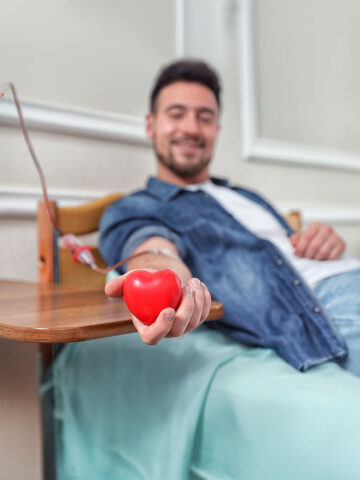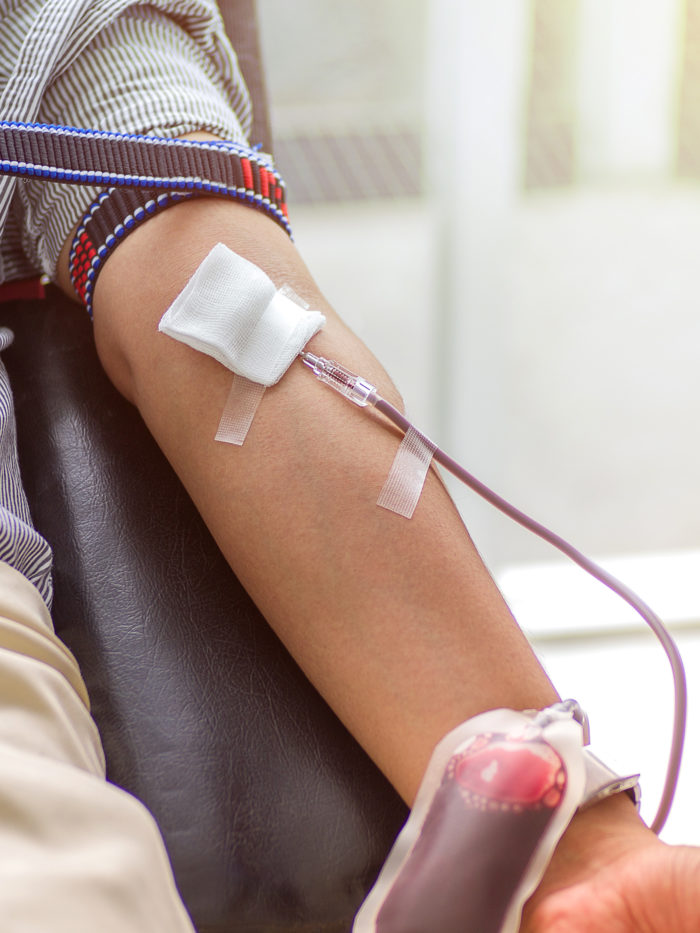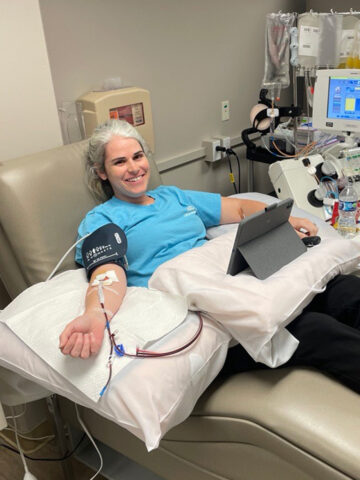June 14 is World Blood Donor Day.
To celebrate, CHOC experts answer frequently asked questions about blood donations, and how parents and teens can get involved.
Why should I donate blood?
Every time a volunteer donates, they can leave knowing they are having a direct impact on the recovery of a child. With thousands of kids and adults needing life-saving blood transfusions each year, many healthcare systems — like CHOC — rely on volunteer blood donors to meet the needs of their patients.
At CHOC’s Blood Bank, every blood donation gives children a better chance at a healthy life.
Who is able to donate blood?
CHOC needs all blood types and welcomes any donors that meet certain requirements. Blood donors must:
- Be in good health.
- Be at least 17 years old.
- Weigh at least 110 pounds.
- Have no history of hepatitis or AIDS.
- Have no history of chest pain or cardiac surgery.
Are there any risks to donating blood?
The Food and Drug Administration (FDA) regulates blood banks in the United States. They make sure that all needles and other equipment used for donating blood are sterile and used only for one person, then thrown away. This ensures that nobody gets an infection or disease from giving blood. Blood centers must also pass regular inspections by the FDA to stay open.
What are the different types of blood donations?
There are three types of blood donations — whole blood, platelets and plasma — that you can make at CHOC’s blood bank.
Whole blood
Whole blood is made up of red blood cells, white blood cells and platelets. Red blood cells carry oxygen to the body’s tissues and remove carbon dioxide. White blood cells help the body fight infection by making antibodies, or proteins, that help destroy germs in the body. Platelets, the smallest blood cells, help blood clot and control bleeding.
Whole blood donations are the most flexible type of donation, and the red blood cells, white blood cells or platelets can be separated and donated to kids who need them. Red blood cells are most commonly transfused and are typically given to kids with sickle cell anemia or significant blood loss due to trauma or surgery. Donating whole blood takes less than an hour.
You can donate whole blood every 56 days.
Platelets
Platelets are the smallest blood cells, which help blood clot and control bleeding. They are used to treat leukemia and other forms of cancer. Platelet donations are done using a machine that separates the platelets from the blood and returns the blood to your body. Platelet donations take from one to two hours, allowing the donor to relax, watch a movie or read a book.
Platelets can be donated every 14 days.
Meet Ron, CHOC’s longest-running platelet donator.
Plasma
Plasma, the pale yellow liquid part of whole blood, is a mixture of water, proteins, electrolytes, carbohydrates, cholesterol, hormones and vitamins. It is needed to carry the many parts of the blood through the bloodstream.
Plasma serves many functions and is generally transfused to replace blood-clotting proteins. During a plasma donation, an automated device is used to separate out the plasma and return the red cells to the donor. Donating plasma typically takes around 45 to 50 minutes.
Plasma donations are especially helpful from donors who have recovered from COVID-19. While researchers are still learning about the disease, it’s possible that those who have recovered from COVID-19 have produced antibodies to protect them from the infection. If so, plasma with COVID-19 antibodies may be helpful in the treatment of COVID-19 in CHOC patients.
Plasma can be donated every 28 days.
Learn more about donating plasma if you’ve recovered from COVID-19 recently.
How should I prepare for my blood donation?
On the day of your donation, make sure to:
- Bring a photo ID to the donor center.
- Wear a shirt with sleeves that you can roll up above your elbows.
- Drink an extra 16 ounces of water or other nonalcoholic beverage before your appointment.
- Be free of cold and flu symptoms.
- Eat a good, healthy meal within three hours of donating.
- Have medications and medical conditions reviewed by the donor center staff.
- Not have taken any aspirin, aspirin products or ibuprofen within 48 hours of donating platelets.
What does the blood donation process look like?
When you donate at CHOC’s blood bank, you will be walked through the entire donation process. Highly trained medical staff and nurses will:
- Ask you questions about your medical history.
- Check your temperature, pulse, blood pressure and blood count for anemia.
- Collect the blood product from your arm while you watch television, see a video, read a book or just relax.
- Give you post-donation instructions and refreshments before you leave.
How will I feel after I donate blood?
After you donate, you may feel a little lightheaded or dizzy. These side effects usually go away after a few minutes. Be sure to drink extra fluids during the 24 hours after you donate. If you still feel unwell after that, call your doctor or have someone else take you to the nearest emergency room.
Most adults have about 10 pints of blood (almost 5 liters) in their bodies. Your body will replace the liquid plasma and platelets within two days and the red blood cells within 56 days.
Medical professionals check all donated blood for viruses — such as HIV, hepatitis B and hepatitis C, syphilis, and West Nile virus — and bacteria. They destroy any blood that contains viruses or bacteria. If your donated blood has any of these germs, the blood bank will notify you.
Meet Steve, who says that donating plasma gave meaning to his battle with COVID-19.
How can I donate blood to CHOC?
Donor recruitment is always challenging, and CHOC wants to keep its blood and platelet inventory robust. Please call the CHOC Blood Bank at 714-509-8339 or email [email protected] to make an appointment. Walk-ins are always welcome.
Not local to Orange County? Visit the Red Cross or other local drives to donate blood.
Get more expert health advice delivered to your inbox monthly by subscribing to the KidsHealth newsletter here.
Learn more about the Blood Bank at CHOC
To schedule an appointment or learn more, call the CHOC Blood Bank at 714-509-8339 or visit choc.org for more information





